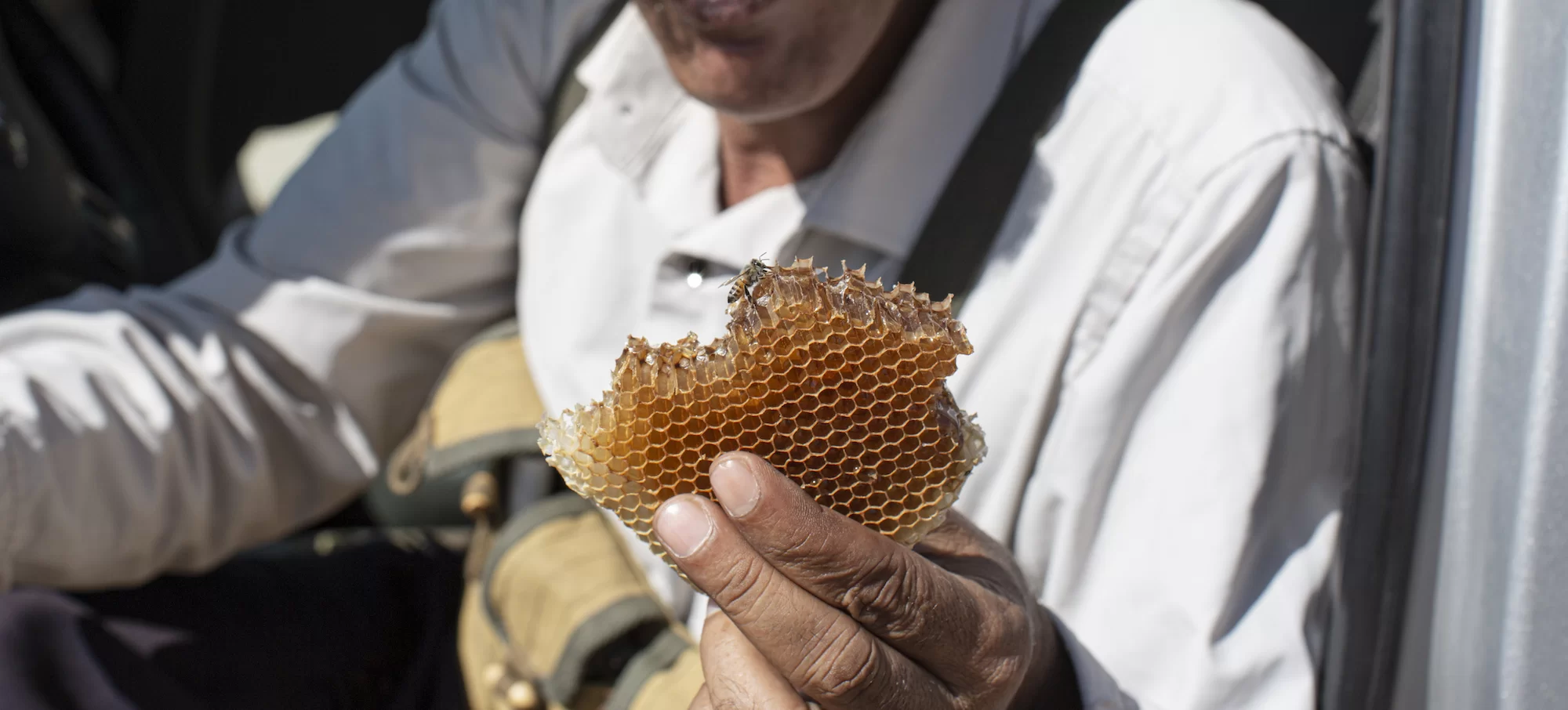This article was written by Dr. Abdullah Nasher and Farea Al-Muslimi
Beekeeping in Yemen is as ancient as Yemeni civilization itself. Yemenis have mastered their beekeeping skills over centuries and can trace their rich heritage in apiculture (beekeeping) back to their pre-Islamic ancestors. In the Kingdom of Hadramawt, during the 10th century BC, trading honey was reported to have been the fourth largest economic sector.[1] Greek historian and philosopher Strabo (64 BC – 24 AD) wrote about honey being a popular commodity in Yemen, observing how Yemenis climbed mountains in search of bee colonies, including Yemen’s Beni Saleem Mountains, which were known for their abundance of honey and have maintained this reputation since pre-Islamic times.[2] To this famed liquid gold, Yemeni lyricists, poets, and singers have in more recent times offered their praise. Ya Asal Do’an (Oh Honey from Do’an),[3] written by poet Hussein Mehdar and sung by the legendary singer Abu Bakr Salem, is just one example of how honey is deeply embedded in Yemen’s popular culture now as it was a thousand years ago.
Today, Yemeni honey is one of the world’s most popular and expensive honey on the market.[4] Widespread in most governorates of Yemen, Hadramawt ranks first in terms of honey production, followed by Shabwa, Abyan, and Hudaydah.[5] The uniqueness of Yemeni honey is due to the distinctive wilderness of Yemen’s bee pastures, found in landscapes ranging from coastlines to mountains, highlands, plains, valleys, and deserts rich in diverse plant life.[6] Of these, the finest honey comes from bees fed exclusively on the flowers of Sidr trees,[7] also known as Christ’s thorn jujube (Ziziphus spina Christi), which abundantly grow in Yemen. Renowned for being pure, unprocessed, and free from chemicals, the net price of a kilo of honey derived from Sidr trees costs at least US$75 in Yemen. Abroad, a kilo of Sidr honey can fetch US$500.
Until recently, honey production had been a lucrative trade for Yemenis. In 2003, honey was one of the five commodities declared by the Yemeni government as a strategic product that can boost the country’s economy. In 2002, the Ministry of Agriculture estimated the number of Yemeni beekeepers to be 81,734.[8] Today, beekeeping continues to represent an important source of income for many low-income (mostly rural) households. A 2020 UN report estimated that around 100,000 households were working in the honey industry and noted a growing trend of Yemeni youth joining the trade.[9] The demographics of beekeepers appear to indeed be changing since the war,[10] from a niche dominated by veteran beekeepers, many of whom inherited the trade from their families, to a sector witnessing an increase in newcomers. These include government employees, who haven’t received regular salaries since the start of the conflict, and who have sought new income-generating activities, as well as internally displaced people who have resorted to beekeeping after moving from cities to more rural areas where bee pastures are located.[11] While in theory such shifts seem promising, among traditional beekeepers the rapid changes that have been triggered by the war seem to be steadily threatening an ancient way of life.
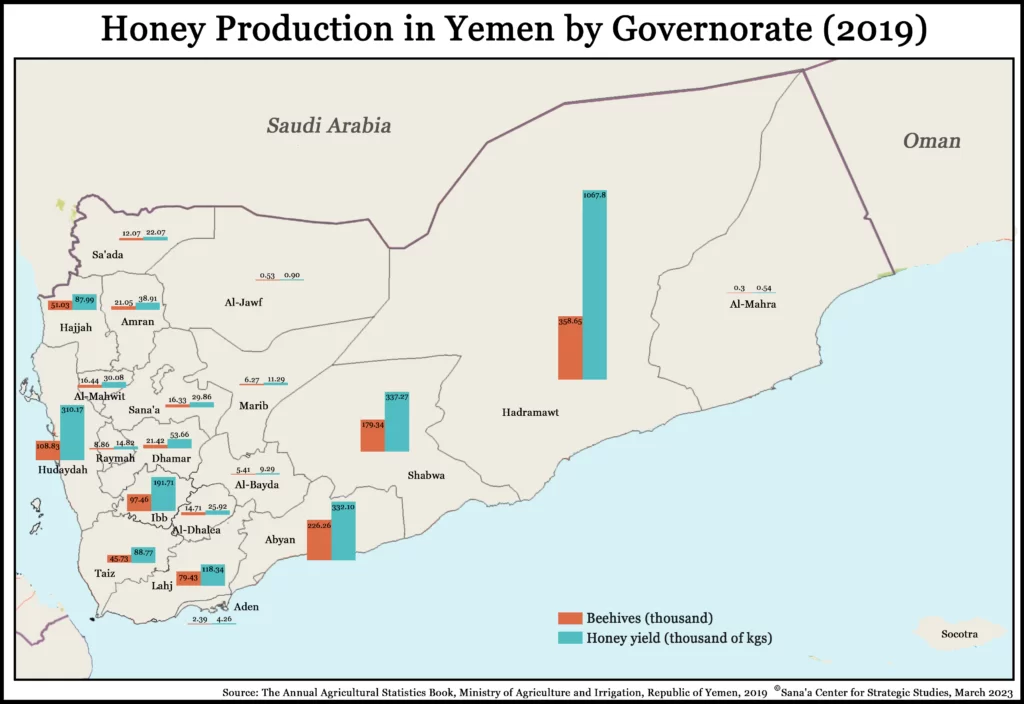 The beekeeping trade in Yemen today faces growing challenges, foremost among which are the curb of its export to the international market; the difficulties in moving bee colonies between pastures due to landmines and checkpoints; the high price of fuel, which has led to the logging of Sidr trees; the effect of climate change; pesticide spraying that harms bees; and arbitrary levies on beekeepers in areas that fall under the control of the de facto authorities in Sana’a as part of their zakat (alms) policies. Based on oral and written sources, as well as discussions held by the authors with Yemeni beekeepers, this analysis explores some of the main challenges confronting Yemen’s honey trade since the war.
The beekeeping trade in Yemen today faces growing challenges, foremost among which are the curb of its export to the international market; the difficulties in moving bee colonies between pastures due to landmines and checkpoints; the high price of fuel, which has led to the logging of Sidr trees; the effect of climate change; pesticide spraying that harms bees; and arbitrary levies on beekeepers in areas that fall under the control of the de facto authorities in Sana’a as part of their zakat (alms) policies. Based on oral and written sources, as well as discussions held by the authors with Yemeni beekeepers, this analysis explores some of the main challenges confronting Yemen’s honey trade since the war.
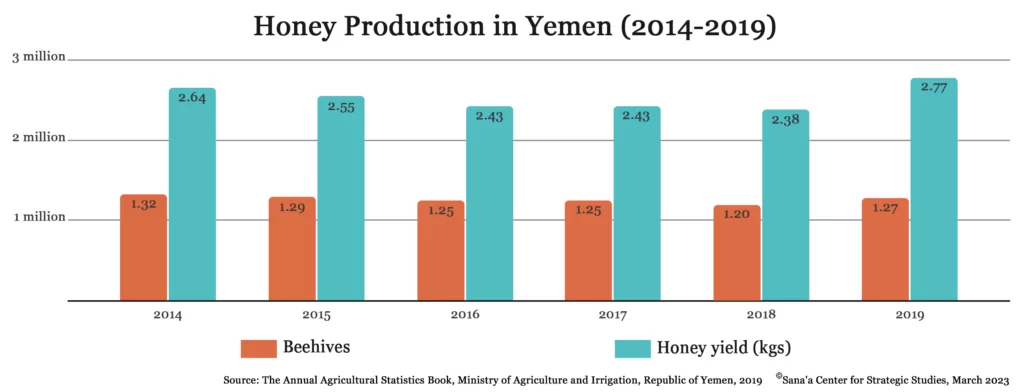 A Trade in Jeopardy
A Trade in Jeopardy
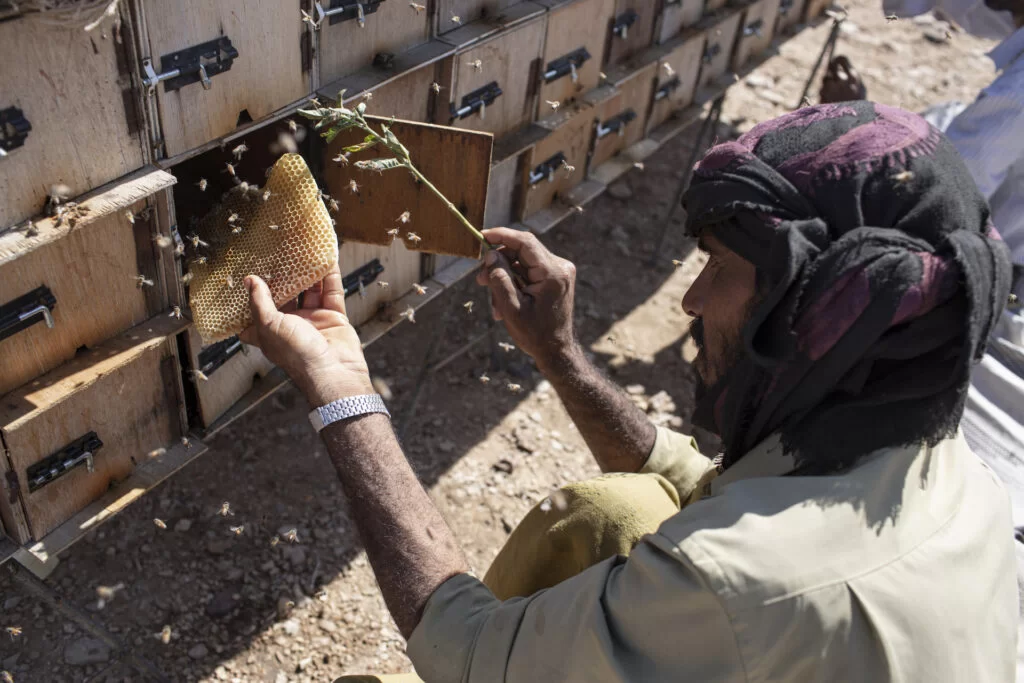
A beekeeper collects honeycomb from hives outside Ataq district in Shabwa governorate on November 16, 2020 // Sana’a Center photo by Sam Tarling
Notorious for its medicinal properties and organic, Yemeni honey has historically been held in high regard and in high demand. In recent decades, the biggest market for the export of Yemeni honey has been the Gulf. In their heyday, well-known beekeepers from Shabwa and Hadramawt were known to cater to the likes of Gulf royals and sheikhs, who would book their honey orders years in advance, mediated by traders of Yemeni origin residing in Saudi Arabia and the wider Gulf region. Although there is still demand, restrictions on shipping and the movement of goods and people since the outbreak of war have made exports from Yemen difficult and dented an otherwise lucrative business for both beekeepers and honey traders. At the start of the conflict, DHL, FedEx, and other shipping companies ceased their operations in Yemen, depriving honey producers of an avenue to access foreign markets. Later, in 2016, an outbreak of cholera in Yemen, and inflated figures cited by international aid organizations to attract more funding, prompted many countries, including Jordan and Egypt, to impose a ban on agricultural products from Yemen, which included honey and fish. Compounding matters is the fact that the credibility of Yemeni honey has been tainted in recent years by some traders who have gotten into the habit of mixing inferior types of honey with Yemeni honey to increase profit.[12] Restoring Yemeni honey’s reputation[13] would need a stronger regulatory framework and specialized laboratories in Yemen that can assure buyers of its quality before export, measures that are currently missing in Yemen.[14] Looking ahead, once exports resume, Yemen would also need to better safeguard its honey in the international market, doing justice to the fact it represents one of the country’s most prized exportable goods.[15]
Landmines and Checkpoints Hinder Beekeepers’ Movements
Beekeeping in Yemen remains largely a traditional[16] and nomadic sector relying on movement between different pastures throughout the year. Unlike most honey producers worldwide, who predominantly rely on static apiaries, Yemeni beekeepers move their bee colonies between the mountains, valleys, and plains in pursuit of suitable pasture. Like shepherds, beekeepers are particularly vulnerable to injury or death from landmines that have been widely planted since the war.[17] The increase in the number of security checkpoints as a by-product of the conflict has also disrupted previously seamless journeys from one pasture to another. Beekeepers need to move their bees at night, when the bees are less active, making it doubly hard to pass through security checkpoints weary of movement after dark. Restrictions on beekeepers’ movements, who are often stopped or delayed at checkpoints, mean that bountiful pasture areas for bees remain unutilized, leading to significant losses in honey production, but also, in some cases, to the death of entire bee colonies. Areas that remain unutilized due to restricted access, ongoing battles, or landmines can lead to an overcrowding of bee colonies in areas easier to access. A female beekeeper from Wessab in Dhamar governorate observed that “a bee does not feed from a flower that another bee has already fed from,” underscoring a challenge that emerges when too many beekeepers work in close proximity.[18] Other beekeepers concurred and said that when overcrowded, bees end up going back to their hives hungry and sometimes eat the honey they already produced.[19]
Arbitrary Zakat Imposed on Beekeepers

A man carrying a container of honey walks past shops in Ataq’s market in Shabwa governorate on November 16, 2020// Sana’a Center photo by Sam Tarling
Beekeepers who fall under the control of the de facto authorities in Sana’a face additional pressure with alms (zakat) imposed on them. Yemen’s 1999 zakat law[20] clearly stipulates how much zakat is due on honey. In the past, tax would be levied according to how many kilos of honey beekeepers produce a year, but recently, beekeepers are being taxed on the number of hives they own.[21] This is problematic given that in some years hives can produce very little to no honey. Also, not all honey produced is sold; among poorer beekeepers, honey is often used for personal consumption or traded in-kind for other basic goods. As they move their bees from one area to another, beekeepers are reportedly being detained at checkpoints on the pretext of not paying zakat. Caught between a rock and hard place, they either succumb and pay zakat based on the arbitrary estimates of those manning checkpoints (in violation of the law) or refuse to pay, in which case their bees face a slow death. Often beekeepers find themselves paying to avert any harm to their bee colonies. Making matters worse, beekeepers are in some cases reportedly forced to doubly pay zakat each time they relocate their bee colonies within areas controlled by the de facto authorities in Sana’a, imposing additional financial burdens and making life difficult for those already struggling with the multifaceted impact of war on their trade.[22]
Climate Change and War Threaten Yemen’s Famed Sidr Trees
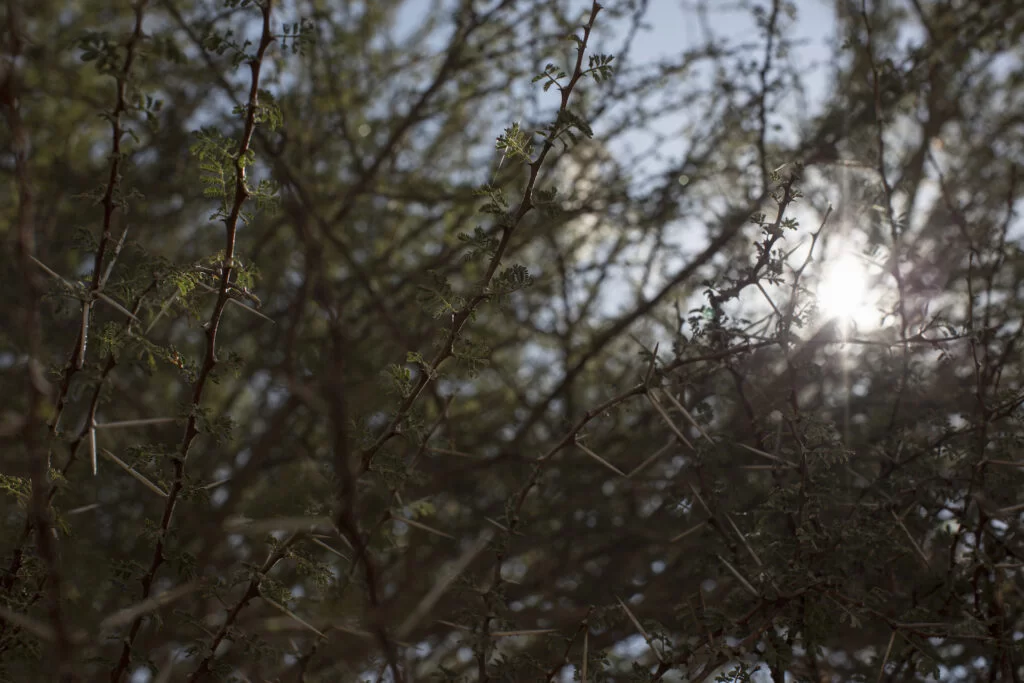
Sidr trees near a set of beehives outside Ataq district in Shabwa governorate on November 16, 2020. Bees feed on Sidr trees to produce one of Yemen’s finest varieties of honey // Sana’a Center photo by Sam Tarling
Sidr trees abound across Yemen’s valleys, plains, and mountains, from coastal areas up to the highlands 2500 meters above sea level. They are resilient and can survive in areas with low rainfall (50-300 millimeters annually) as well as in the arid desert due to their ability to withstand high temperatures and drought.[23] Yemen’s famed Sidr honey[24] comes in a number of varieties, with the most sought-after ones being the Sidr al-Doani (produced in Wadi Do’an in Hadramawt), Sidr al-Osaymi (produced in the Osaymat area of Amran governorate), Sidr al-Jardani (produced in Jardan district in Shabwa ), and Sidr al-Wessabi (produced in the Wessab region of Dhamar governorate).[25] Large populations of perennial Sidr trees, whose lifespan can extend hundreds of years, flourish in these areas. The fact that there are no bee pastures that blossom simultaneously with Sidr trees means the quality of the Sidr honey produced from these areas, where bees feed exclusively on Sidr flowers, is particularly high.
Unseasonal rains in Yemen triggered by changing climate patterns are, however, throwing off flowering seasons and making it hard for beekeepers to gauge when best to feed their bees.[26] Heavy downpours in recent years have knocked flowers off the branches of Sidr trees before bees could get to them.[27] Rising poverty in Yemen has also led to an increase in illegal logging, including that of Sidr trees. Demand for firewood for cooking and heating purposes has soared due to fuel shortages and the high cost and regular shortage crisis of cooking gas which has led people to resort to the chopping of trees for both subsistence and to earn a living. Displacement due to armed clashes, particularly in coastal areas, has also led to more logging by displaced Yemenis who chop trees to build makeshift houses or to produce charcoal.[28] The extent of damage from the logging of trees on Yemen’s floral environment and honey production is yet to be examined, but illegal logging appears to be widely prevalent, including in nature reserves such as Ottomah.[29] What is certain is that the effects of climate change, and the slim likelihood of future governments investing in the replacement of ruined pastures at the rate and investment needed, will have a lasting impact, with clear implications on people’s livelihoods, but also on Yemen’s ancient craft.
Pesticides Harming Yemen’s Honey Bees
Small, strong, and highly resistant to diseases, Yemen’s honey bees (Apis mellifera jemenetica[30]) are typically known for being a healthy bee subspecies. Part of the reason why Yemeni honey is so highly sought after is that Yemeni beekeepers generally do not need to use chemicals that are commonly utilized internationally to control diseases affecting bees,[31] which normally leave antibiotic residue in honey.[32] Recent wide-scale pesticide spraying campaigns, however, are threatening bee colonies in some parts of Yemen. These public health campaigns often follow periods of torrential rains and flash floods that increase the risk of the spread of diseases like malaria, but also locust infestations that can devastate crops and pastures. Throughout 2020 and early 2021, in areas under the control of the de facto authorities in Sana’a, the Ministry of Agriculture and Irrigation carried out intensive campaigns for locust control. Mosquito control campaigns were also carried out by the Malaria Control Program of the Ministry of Health and Population. Both had a severe impact on bee colonies, particularly in western regions stretching from the border with Saudi Arabia southward to Taiz governorate. Spraying campaigns were reportedly conducted without warning, despite a ministerial decree[33] stipulating that beekeepers must be given five days prior notice, which meant that bees were significantly impacted.
The war has also disrupted beekeeping patterns that are largely intuitive and have contributed to a unique tradition that makes Yemen’s honey trade so distinct. For instance, beekeepers from across Yemen traditionally take their bees to the Tihama region (particularly Hudaydah governorate) once a year so that their bee colonies can feed on Tihama trees, known among beekeepers for their health benefits to bees. Since the battle of Hudaydah in 2018, however, beekeepers have been unable to access these pastures, in part due to the proliferation of landmines. “It’s like having a kid that grows up without protein,”[34] said a beekeeper from Wessab, on what this means for the larger health and life of Yemeni honey bees without access to Tihama’s bee pastures, as these pastures are rich in pollen necessary for the reproduction of bees.
Safeguarding Yemen’s Ancient Trade
“And your Lord inspired the bees: ‘Make your homes in the mountains, the trees, and in what people construct, and feed from the flowers of any fruit you please and follow the ways your Lord has made easy for you.” From their bellies comes forth liquid of varying colors, in which there is healing for people. Surely in this is a sign for those who reflect.”
The Holy Quran, Surat al-Nahal – Verses 68&69
Named after bees, Surat an-Nahal, the 16th chapter of the Quran, is an allegory promoting the exemplary life of bees for human beings. Hardworking, efficient, and coordinated, honey bees are cooperative creatures, revered in Islam as God’s divine miracles. In the heart of the land where they have thrived for centuries, and where current disunity risks further tearing Yemen apart at its seams, the significance of bees as a unifying metaphor is hard to miss and the need to recognize the plight of Yemen’s honeymaking tradition is never more timely.
While there is potential income to be made in the honey trade, which can support low-income families and contribute to Yemen’s economy at large, the current conflict, intensified by climate change, is threatening Yemen’s most ancient craft. If protected, honey production could be a thriving sector for rural communities in Yemen. This requires that relevant authorities step in and safeguard a trade that is as old as time. In practice, this would mean facilitating beekeepers’ movement across the country, in recognition of the reality that entire livelihoods are destroyed by stalling beekeepers at checkpoints, as well as the threats to an ecosystem that depends on bees. The additional burden of paying undue zakat, which is often imposed arbitrarily, as a condition to pass through checkpoints should also be stopped, and provisions to adhere to article 16 of Yemen’s zakat law should be strengthened.
Wide-scale pesticide spraying carried out under public health campaigns must give early warning to beekeepers to ensure they can protect their colonies. Equally, accountability within relevant bodies and compensation for those whose livelihoods have been affected because of badly thought-out pesticide campaigns should be considered. Other necessary steps to mitigate the current onslaught of Yemen’s bee pastures include enacting measures to end illegal logging in bee pastures and penalties for using firewood in restaurants and bakeries where domestic gas is available. Longer-term strategies must also include a clear afforestation plan with a view to restoring bee pastures that have been ruined in recent past years, particularly Sidr, Sumar, and Salam trees, and earmarked funds for this purpose. This could entail organized and contextual support for beekeeping projects by international organizations and donors, ensuring they build on Yemeni beekeepers’ knowledge and traditions. Like bees, whose survival strategy depends on their meticulous coordination, beekeepers also need to better organize to advocate for their cause. This would require stronger syndicates or unions than current ones in Yemen, which would serve as a platform to better protect their industry and make their voices heard.
This artcle was published by Sana’a Center
